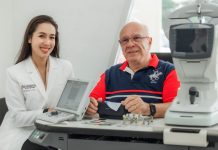I think most of us, when pressed, will admit to abusing our bodies. We punish our livers (New Year being a fine example), we also punish our brains with alcohol and we punish our joints and cardiovascular systems by being overweight. We also regularly make New Year resolutions to stop doing all of the above, which lasts until February 1!
However, most patients self-select into two very different groups. There are those who worry about every symptom they ever get, and then there are those who ignore their body’s telling them of things that are amiss.
It is between these two sides that the field of self-monitoring lies. Some patients will slavishly carry out examination and recording far more than their disease process would require, but others will just not do these simple procedures, as they refuse to admit to sickness or ill-health in any way.
I am discussing here long term monitoring of chronic ailments, such as hypertension, diabetes or asthma. I am not asking patients to become doctors and make their own diagnoses. Sometimes it is hard enough for experienced doctors to do that!
This whole business of self monitoring is something that actually gets much space in the medical literature, and the medical profession itself is also divided over this issue. Here I will try to provide the ‘middle ground’, which itself is not without certain problems.
Let’s take Blood Pressure problems first. In actual fact it is quite difficult to get accurate blood pressure readings. Blood pressure is a dynamic factor in the body. Step off the kerb and be narrowly missed by a motorcycle and your blood pressure will rise immediately. If it doesn’t, it probably means that he hit you and you are already dead. There is also a well documented type of high blood pressure reading called ‘White Coat Hypertension’, where the BP goes up as the white coated doctor gets closer.
So what is your ‘real’ blood pressure reading? For me, one isolated raised reading does not mean you have hypertension. All that the one reading means is at that particular time, for any number of reasons, your BP was elevated. It could be down again tomorrow. Only by taking serial readings will you (and your doctor) really know. Do not let anybody tell you that you have hypertension on one isolated reading!
However, if a definitive diagnosis of hypertension has been made, this is where self monitoring can be very good. You can return to your doctor and give him serial readings, taken at home, and these will probably be closer to the ‘real’ numbers than ones taken in the sterile and sometimes frightening doctor’s office. Mind you, this does depend upon accurate home measurement, using accurate equipment.
However, the physicians with the care of diabetic patients are not so enamored of glucose self monitoring as the cardiologists are with BP readings. There is little evidence that home blood glucose monitoring improves outcomes in Type 2 diabetic patients. There may even be negative effects associated with it, including increased distress and worry. Regular hemoglobin A1c levels are more appropriate than daily finger pricks. Since the Hb A1c levels show the overall diabetic control over the previous three months, it is actually a more consistent monitor, but there is no easy home testing kit. It’s back to lining up to see your diabetic specialist on a regular basis, I’m afraid.
And so to asthma. The respiratory physicians seem to be more in agreement with home monitoring for this chronic condition. Serial lung function testing with simple hand-held devices can show the asthma sufferer the trends of decreasing or increasing respiratory function. At predetermined levels, the patient can be instructed to initiate different therapies to stop them going into a full-blown asthma attack. This is self monitoring towards a preventive end. The main aim in asthma treatment.
The message is simple. If you have a long-term condition, don’t ignore it, but monitor it! And report to your doctor regularly.
And finally, if you are thinking about the 50 percent discount check-ups at the Bangkok Hospital Pattaya, you have to pay for it by December 31. Get your skates on!




